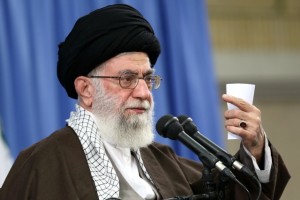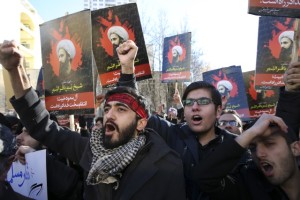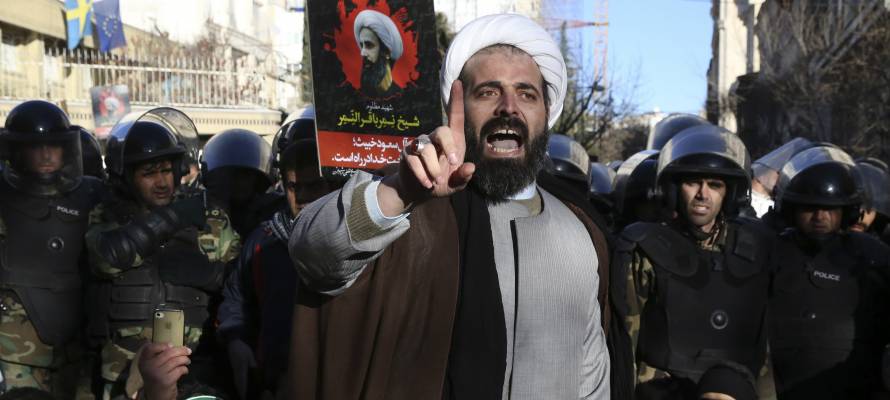Is the Middle East on the path to a full-blown Sunni-Shiite confrontation? In what may be a precursor to a military conflict, Saudi Arabia cut off diplomatic ties after Iranians attacked its embassy over the Saudi execution of a Shiite cleric.
Saudi Arabia has severed diplomatic ties with regional rival Iran following attacks on the kingdom’s embassy and consulate in the Islamic Republic over the execution of a prominent Shiite cleric in Saudi Arabia.
Saudi Foreign Minister Adel al-Jubeir announced the cut in relations late on Sunday and gave Iranian diplomatic personnel 48 hours to leave the country. All Saudi diplomatic personnel in Iran have been called home after an attack on the Saudi’s embassy in Tehran and a consulate.
The decision came after the mass execution of Shiite Sheikh Nimr al-Nimr and 46 others — the largest carried out by Saudi Arabia in three and a half decades — laid bare the sectarian divisions gripping the region. Shiite protesters took to the streets from Bahrain to Pakistan while Arab allies of Sunni-ruled Saudi Arabia quickly lined up behind the kingdom.
The standoff illustrates the kingdom’s new aggressiveness under King Salman. During his reign, Saudi Arabia has led a coalition fighting Shiite rebels in Yemen and staunchly opposed regional Shiite power Iran, even as Tehran struck a nuclear deal with world powers.
It also represents just the latest turmoil in the two countries’ long-rocky relationship, which saw diplomatic ties between them severed from 1988 to 1991.

Ayatollah Ali Khamenei. (Office of the Iranian Supreme Leader via AP)
Iran’s supreme leader, Ayatollah Ali Khamenei, warned Saudi Arabia on Sunday of “divine revenge” over al-Nimr’s death, while Riyadh accused Tehran of supporting “terrorism” in a war of words that threatened to escalate even as the US and the European Union sought to calm the region.
Al-Jubeir told a news conference in Riyadh that the Iranian regime has “a long record of violations of foreign diplomatic missions,” dating back to the occupation of the US Embassy in 1979, and such incidents constitute “a flagrant violation of all international agreements,” according to the official Saudi Press Agency.
He said Iran’s “hostile policy” was aimed “at destabilizing the region’s security,” accusing Tehran of smuggling weapons and explosives and planting terrorist cells in the kingdom and other countries in the region. He vowed that Saudi Arabia will not allow Iran “to undermine our security.”
Al-Nimr was a central figure in Arab Spring-inspired protests by Saudi Arabia’s Shiite minority until his arrest in 2012. He was convicted of terrorism charges but denied advocating violence.
An Iranian official has denounced Saudi Arabia’s move to cut diplomatic relations with Iran and accused the Sunni kingdom of stoking tensions region-wide.
Foreign Ministry spokesman Hossein Jaberi Ansari also said Monday that Saudi Arabia’s execution of prominent Shiite cleric Nimr al-Nimr over the weekend was an example of this.
Ansari claims that “Saudi Arabia sees its interests and even its existence in continuing tensions and clashes.” He spoke during a weekly press conference in Tehran.
He says the kingdom “tries to resolve its domestic problems through projecting and exporting them abroad.”
Mounting Muslim Sectarian Tension
While the split between Sunnis and Shiites dates back to the early days of Islam and disagreements over the successor to the Prophet Muhammad, those divisions have only grown as they intertwine with regional politics, with both Iran and Saudi Arabia vying to be the Mideast’s top power.
Iran accuses Saudi Arabia of supporting terrorism in part because it backs Syrian rebel groups fighting to oust its embattled ally, President Bashar Assad. Riyadh points to Iran’s backing of the Lebanese Hezbollah and other Shiite terrorist groups in the region as a sign of its support for terrorism. Iran also has backed Shiite rebels in Yemen known as Houthis.

Iranian demonstrators chant slogans during a protest denouncing the execution of Sheikh Nimr al-Nimr. (AP/Vahid Salemi)
In Tehran, a protest outside the Saudi Embassy early Sunday quickly grew violent as protesters threw stones and gasoline bombs at the embassy, setting part of the building ablaze, according to Gen. Hossein Sajedinia, the country’s top police official, the semi-official Tasnim news agency reported.
Forty people were arrested and investigators were pursuing other suspects, Tehran prosecutor Abbas Jafari Dowlatabadi said, according to the semi-official ISNA news agency.
Iranian President Hassan Rouhani condemned Saudi Arabia’s execution of al-Nimr, but also branded those who attacked the Saudi Embassy as “extremists.”
“It is unjustifiable,” he said in a statement. Another Saudi diplomatic mission was also attacked in Mashhad.
West Works to Calm Muslim Tensions
Western powers sought to calm the tensions.
In Washington, State Department spokesman John Kirby said the Obama administration was aware of the Saudis’ severing of ties with Tehran. “We believe that diplomatic engagement and direct conversations remain essential in working through differences and we will continue to urge leaders across the region to take affirmative steps to calm tensions,” Kirby said.
Earlier, EU foreign policy chief Federica Mogherini spoke to Iranian Foreign Minister Mohammad Javad Zarif by phone and urged Tehran to “defuse the tensions and protect the Saudi diplomats,” according to a statement.
Implications of Regional Strife
The disruption in relations between Saudi Arabia and Iran may have implications for peace efforts in Syria.
US Secretary of State John Kerry and others spent significant time trying to bring the countries to the negotiating table and they both sat together at talks aimed at finding a diplomatic solution to the civil war. Last month, Saudi Arabia convened a meeting of Syrian opposition figures that was designed to create a delegation to attend peace talks with the Syrian government that are supposed to begin in mid-January.
Across the region, demonstrators took to the streets Sunday in protest over the execution of al-Nimr.
In Bahrain, police fired tear gas and birdshot at demonstrators on Sitra Island, south of the capital, Manama, wounding some. In al-Daih, west of the capital, Shiite protesters chanted against Saudi Arabia’s ruling Al Saud family, as well as against Bahrain’s ruling Al Khalifa family.
In Beirut, Hezbollah leader Hassan Nasrallah called al-Nimr “the martyr, the holy warrior,” while protests erupted from Turkey to India to Pakistan.
Meanwhile, al-Nimr’s family prepared for three days of mourning at a mosque in al-Awamiya village in the kingdom’s al-Qatif region in predominantly Shiite eastern Saudi Arabia. The sheikh’s brother, Mohammed al-Nimr, told The Associated Press that Saudi officials informed his family that the cleric had been buried in an undisclosed cemetery, a development that could lead to further protests.
Early Monday, the state-run Saudi Press Agency said a shooting targeting security forces in the village killed a man and wounded a child. It offered no motive for the attack.
By: AP
